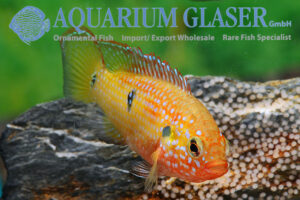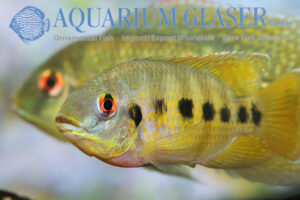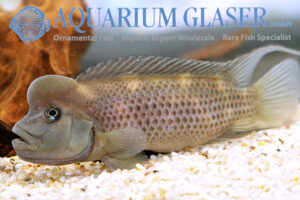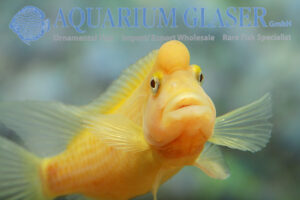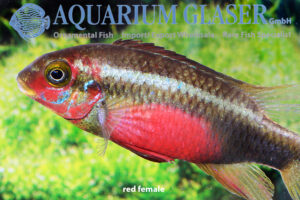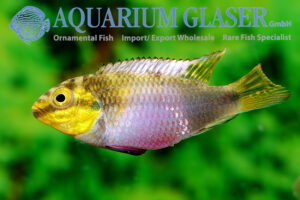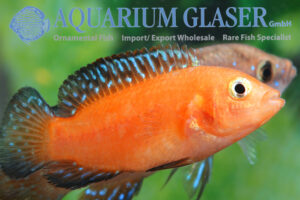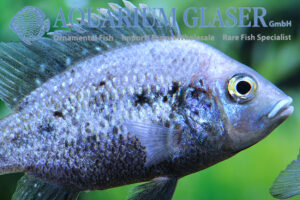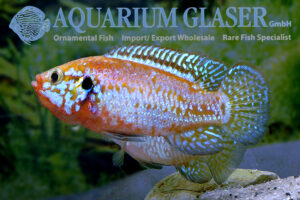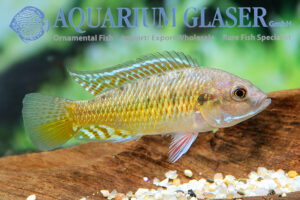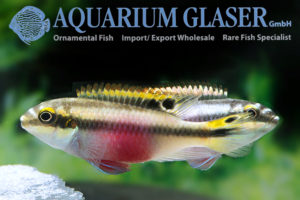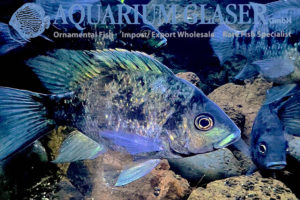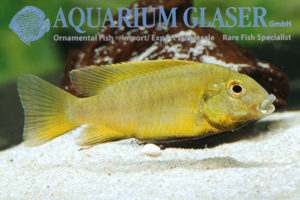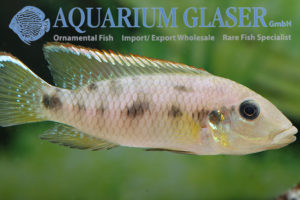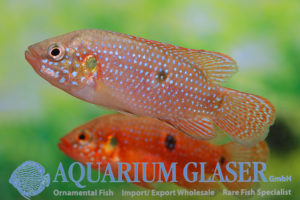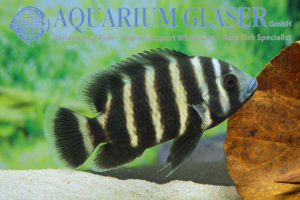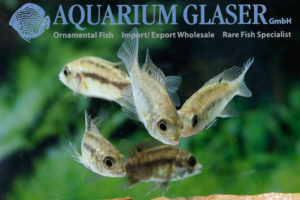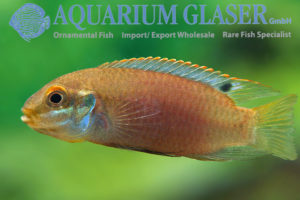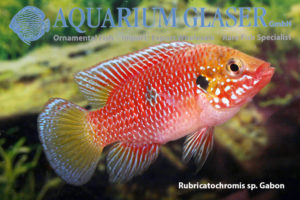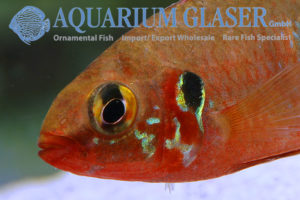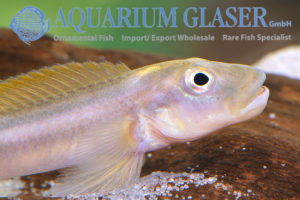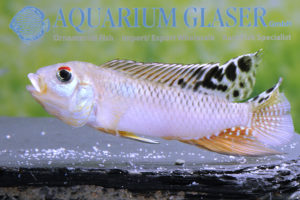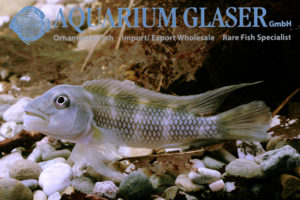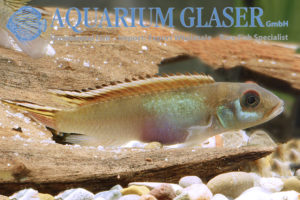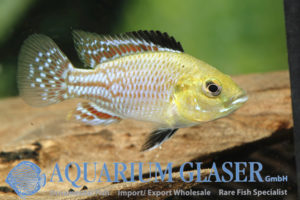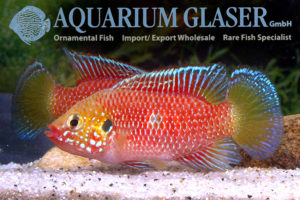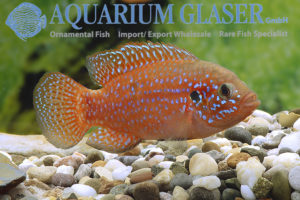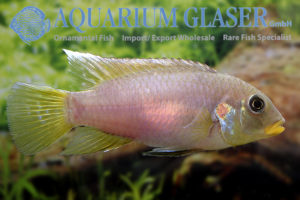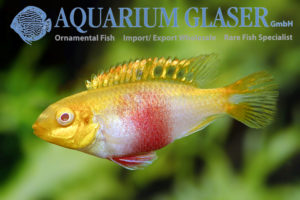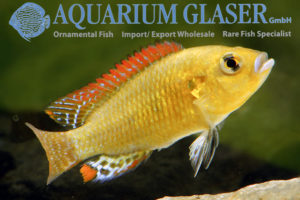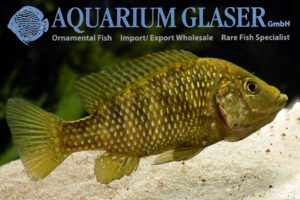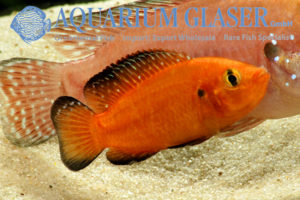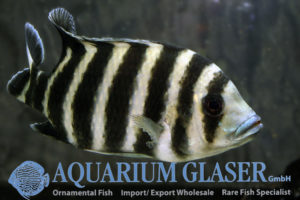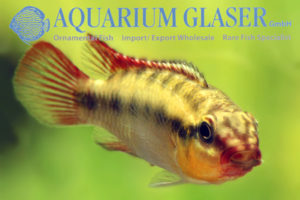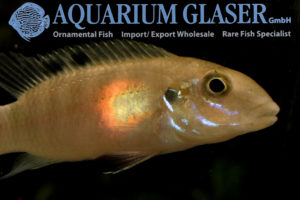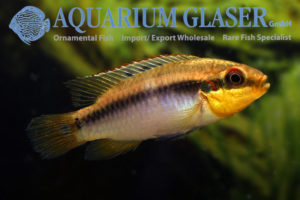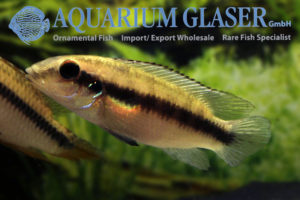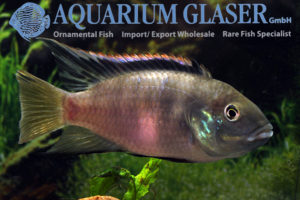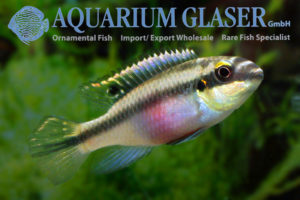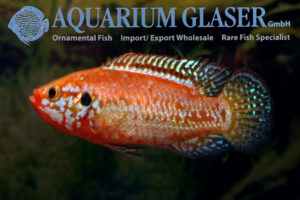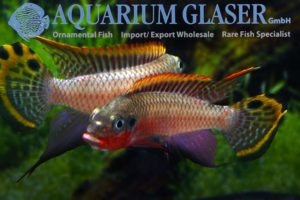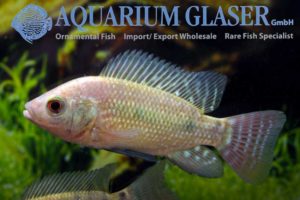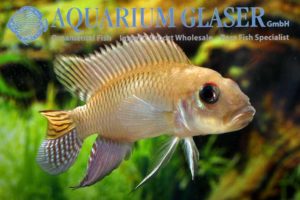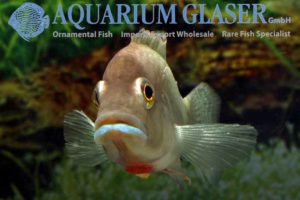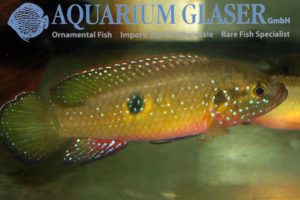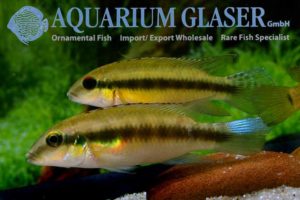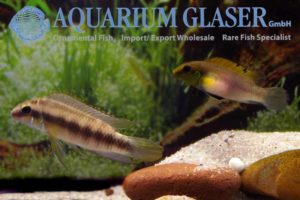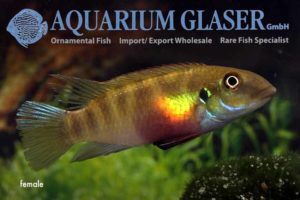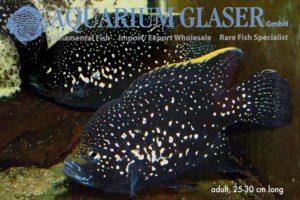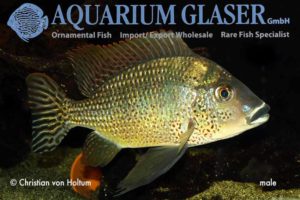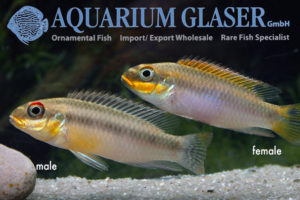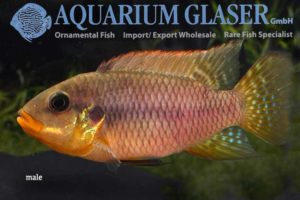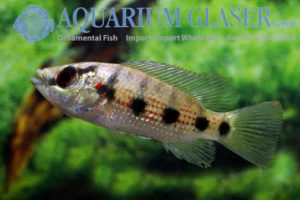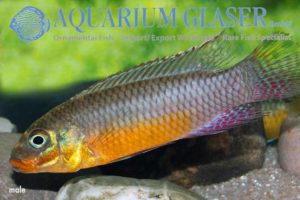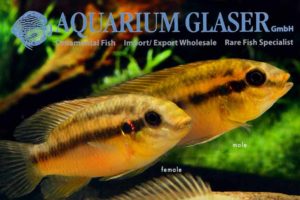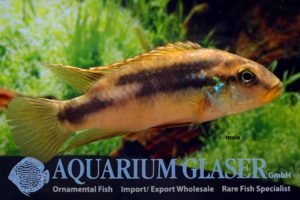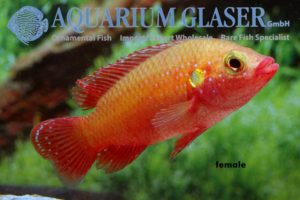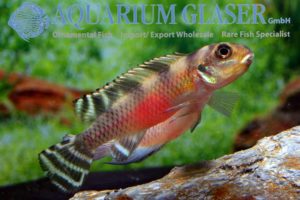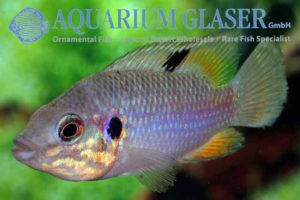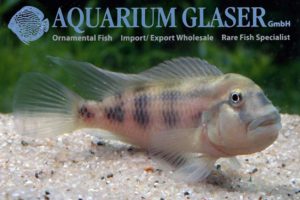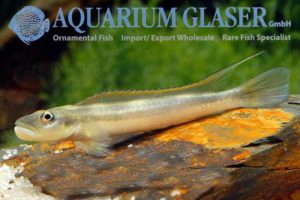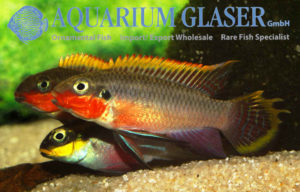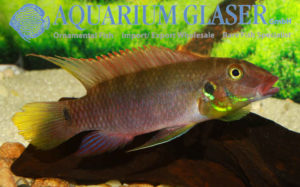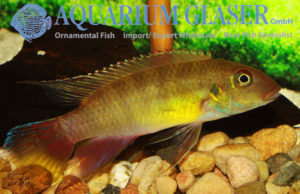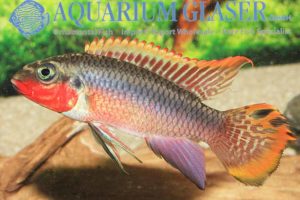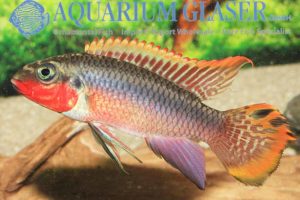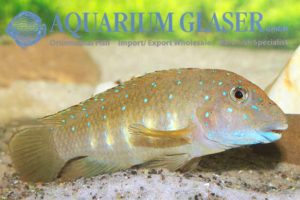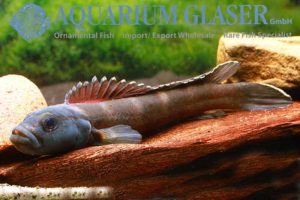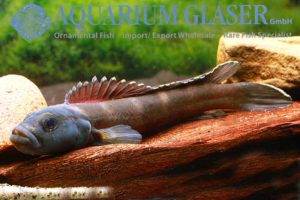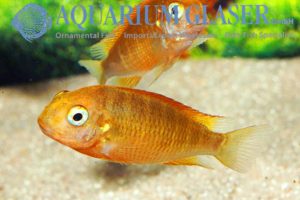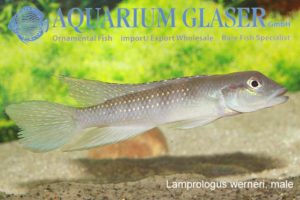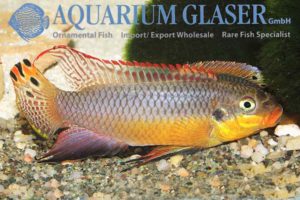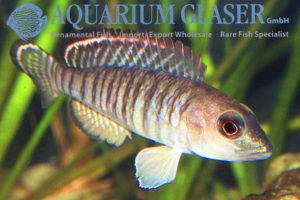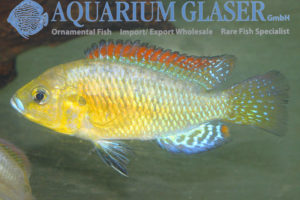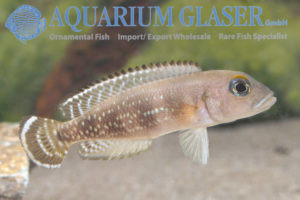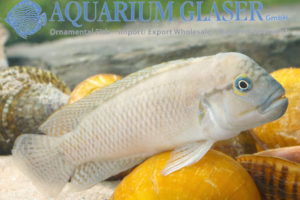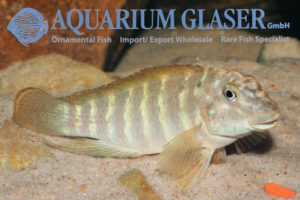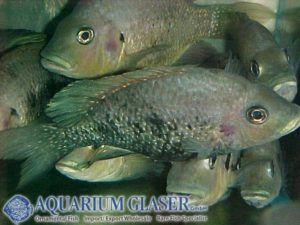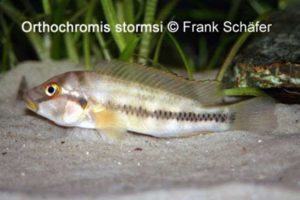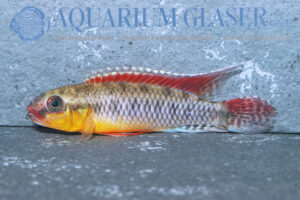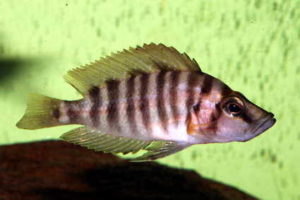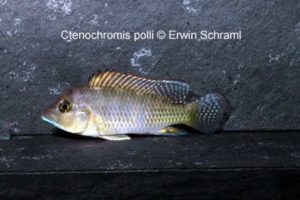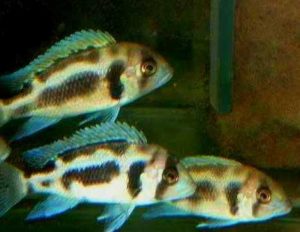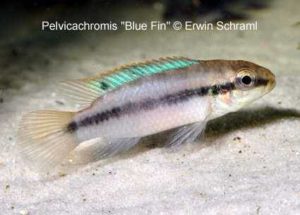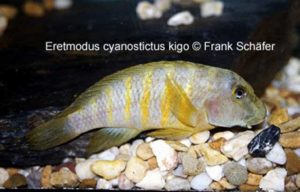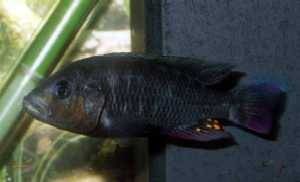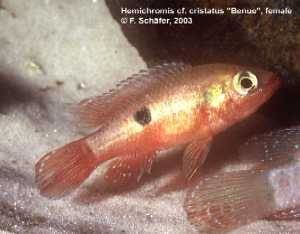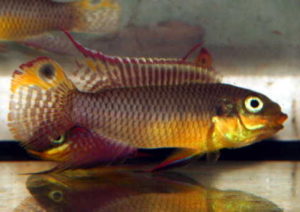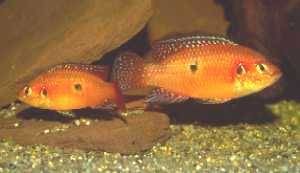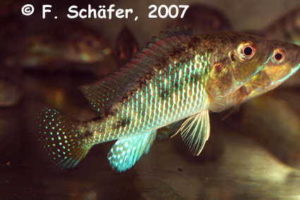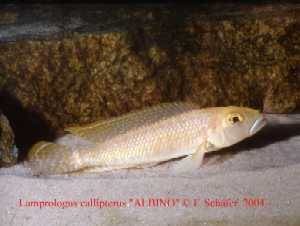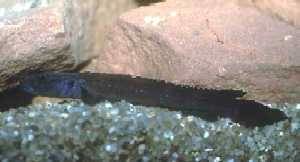The red jewel cichlids (Rubricatochromis, formerly Hemichromis) have been appearing in thermal waters in Central Europe for decades and seem to feel very much at home there. The first documented cases date back to the 1970s from the warm streams of Villach (Carinthia, Austria), but in the meantime they have appeared almost everywhere where the […]
25c. Perchlike fishes (3): Remaining cichlids from Africa (93)
-
-
Pelmatolapia mariae
In contrast to the larger Central American cichlids of the Cichlasoma relationship, the medium-sized African cichlids of the Tilapia relationship, which are ecologically quite similar to them, have never managed to become widespread in aquariums. The reasons for this lie in the geographical proximity of Africa to Europe. When aquarium keeping became widespread around 1900 […]
-
Steatocranus casuarius
The humphead cichlids (Steatocranus) are among the most interesting cichlids in Africa. In adaptation to their way of life in nature – they colonize boulder bottoms in the area of rapids – they have reduced their swim bladder and cannot float freely in the water without making swimming movements with their fins. There are eight […]
-
Steatocranus casuarius Gold
Yellow or gold coloration is generally widespread in fish and, although the animals affected by the corresponding mutation are very conspicuous and can therefore be easily preyed upon by predators, they also occur from time to time in nature. The goldfish is such a xanthorist (xanthorism is the technical term for this mutation). Among cichlids, […]
-
Pelvicachromis sacrimontis ( = P. pulcher RED wild)
The kribensis cichlid (Pelvicachromis pulcher), also known as the king cichlid, is the most popular dwarf cichlid from Central Africa. In the wild, it colonizes large areas in the Niger River basin. It is mainly bred in the hobby. Like so many dwarf cichlids, P. pulcher is also polychromatic, i.e. it occurs in different color […]
-
Pelvicachromis subocellatus “Moulondo”
The dwarf cichlids of the Pelvicachromis genus, in the form of P. pulcher, are the most popular cichlids from Africa. They are colorful, relatively peaceful, adaptable and have a very interesting family life. Pelvicachromis have a mother-father family in which the more colorful female is responsible for caring for the spawn laid in a cave […]
-
Rubricatochromis exsul ( = Hemichromis exsul)
The red jewel cichlids (Rubricatochromis, formerly classified as Hemichromis) are without doubt among the most beautiful fish in the world, at least some of them. If they weren’t such excellent parents, who regard every other fish in the aquarium as an enemy of their young and beat them up as a precautionary measure during the […]
-
Ptychochromis oligacanthus
The Red List of endangered animal and plant species is getting longer and longer. The cause is almost invariably the destruction of the natural habitat. In the case of freshwater fish, species with a small distribution area are always particularly endangered. In addition to factors such as environmental pollution, deforestation and water extraction for agriculture, […]
-
Rubricatochromis sp. Neon
If aquaristics were exclusively about colors, there would hardly be any need for species other than Rubricatochromis. The “Neon” is probably a breeding form created by crossing and selection, in which the blue iridescent spots, which most red jewel cichlids have, are combined to form larger areas. In terms of body shape, Hemichromis sp. Neon […]
-
Pseudocrenilabrus sp. Ruaha
The small mouthbrooders of the genus Pseudocrenilabrus have been kept and bred in the aquarium since the beginning of modern aquaristics – in the 1880s. The species P. multicolor was once so popular that it was simply called “the mouthbrooder“, although it was already known at the time that there were hundreds of species of […]
-
Pelvicachromis pulcher wild yellow
The yellow color variety of the species P. pulcher comes from southwestern Nigeria, where it is collected west of the Niger Delta in the Ethiop River area. The additional color designations yellow, red and green refer to the gill covers in P. pulcher, they all get red bellies. In all Pelvicachromis, females are considerably more […]
-
Ptychochromis oligacanthus
Of the cichlids endemic to Madagascar, Ptychochromis oligacanthus is also quite well known aquaristically by name. However, the understanding of what is meant by this species has changed thoroughly only a few years ago (2006). Previously it was believed that the species was widespread and divided into four different colored races. Today these races are […]
-
Coptodon gutturosus
Cichlids form new species comparatively quickly when placed in geographic isolation. For them, the speciation process often takes only a few decades or centuries, whereas other groups often need millennia. Lake Bermin in Cameroon is a comparatively tiny crater lake with a surface area of only 0.6-0.7 km2. The lake is located in a former […]
-
Chromidotilapia kingsleyae
The wonderful West African cichlids have been somewhat forgotten in recent decades. In the 1970s and 1980s, on the other hand, they experienced a real boom and a great many new species were discovered at that time because ornamental fish collectors were only too happy to fulfill the aquarists’ desire for previously unseen cichlids. Many […]
-
Rubricatochromis “lifalili” (formerly: Hemichromis)
There is no doubt about it: the Red Jewel Cichlids, formerly called Hemichromis bimaculatus, are among the most popular aquarium fishes. For several generations of mankind they have been swimming in the aquariums of the world and find again and again new, enthusiastic followers – however also aquarists who swear an oath: never again Red […]
-
Heterotilapia buettikoferi (formerly: Tilapia b.).
The large cichlids of South and Central America have a firm place in aquaristics. However, aquarists have a mental problem with the no less magnificent large cichlids of Africa. When the name “tilapia” is mentioned in a fish discussion, everyone immediately thinks of gray underwater lawnmowers with carp format. There is a grain of truth […]
-
Ptychochromis insolitus
One of the rarest animals in the world is this Madagascar cichlid, which was only scientifically described in 2006 and already in 2013 it was feared to be extinct. It existed in only one river on Madagascar, the Mangarahara, after which the perch is also called Mangarahara cichlid. A dam project and excessive water extraction […]
-
Enigmatochromis lucanusi
After many years we received again this beautiful pastel colored dwarf cichlid from Guinea. Only in 2009 the species, which belongs to a group of species popularly also called king cichlids, was scientifically determined, before it was known in the hobby as “Pevicachromis sp. aff. roloffi Blue Fin”. The females of this species show – […]
-
Rubricatochromis: a new genus name for the red jewel cichlids
Red jewel cichlids are among the most popular aquarium fishes of all. For over 100 years, they have delighted aquarists around the world with their blaze of color and wonderful breeding habits. There is disagreement about the number of species, because these fish are very variable. Until now the red jewel cichlids were known under […]
-
Hemichromis sp. ,,Ankasa”
We have received very nice offsprings of this attractive red jewel cichlid (Hemichromis). The animals are 4-6 cm long at the moment and thus just at the border to sexual maturity. Fully grown they are with about 10 cm. Then they are much more high-backed and have a splendid red coloration, which is only indicated […]
-
Steatocranus tinanti
Unfortunately imports from the Congo are becoming more and more rare, but when they do come, they usually include humphead cichlids (Steatocranus). There are almost always three species mixed. The strongest and most high-backed of them is S. casuarius, which can be recognized by the black scale centers. It has – due to mood – […]
-
Nanochromis cf. teugelsi
We have received beautiful offspring specimens of this magnificent Nanochromis from the Congo. Since the experts are not yet agreed whether this species is a color variant of Nanochromis teugelsi or a different species, we have chosen the name Nanochromis cf. teugelsi. The beautiful dwarf cichlids reach a length of about 7 cm in the […]
-
Steatocranus gibbiceps
Our current Congo import contains again two species of the funny humphead cichlids: Steatocranus casuarius and S. gibbiceps. They look very similar to each other at first sight (and we can hardly avoid in wholesale that sometimes a casuarius is among the gibbiceps and vize versa), but when looking closely you can see that in […]
-
Nanochromis parilus wild
Since a long time we received again a Congo import. Beside many other interesting fishes and novelties also the good old acquaintance Nanochromis parilus was among them. These beautiful, assertive dwarf cichlids are very common in the region around the capital Kinshasa. It is astonishing that they were described by science only in 1976. In […]
-
Pseudocrenilabrus nicholsi
This dwarf mouth-breeder comes from the middle and upper Congo, from where ornamental-fish-imports almost never reach us. Pseudocrenilabrus nicholsi is therefore only available as bred ones. The males are beautiful, the females are rather plain colored. The maximum length is about 7 cm, but also this size is reached rather rarely; the photographed, sexually mature […]
-
Hemichromis sp. Red Gabon
Red Jewel Cichlids are gorgeous fishes. Their splendid coloration can be hardly topped. And they have a fascinating behaviour. They form a biparental family, both male and female take carefor the offspring together. No real hobbyist can hestitate to be banned by that look. The only negative aspect of these fishes is: they can be […]
-
Hemichromis guttatus “Paprika”
Right now we have German offspring of Red Jewel Cichlids – probably Hemichromis guttatus – in stock, which have a very interesting history. They are descendants of wild catches from Hungary! In Hungary, more precisely in the Hévíz region, there is a thermal lake fed by natural hot springs. It is not known by whom […]
-
Benitochromis riomuniensis
Benitochromis are closely related to the Pelvicachromis species and can be compared regarding the aquarium biology quite good with these peaceful and colorful cichlids. In contrast to Pelvicachromis, which are cave brooders, Benitochromis are biparental, ovophilous mouthbrooders. This means that both parents take care for eggs and fry; eggs and fry are given from parent […]
-
Pelvicachromis pulcher Albino
Breeding forms are like certain foods: you like them – or not. But it is a fact that the aquarium hobby, like all other areas of domestic animal and plant care, cannot get along without breeding forms. The albino of the krib, Pelvicachromis pulcher, is a breeding form whose charm is not obvious at […]
-
Pseudocrenilabrus philander dispersus
When in 1902 the Dwarf Egyptian Mouthbrooder (Pseudocrenilabrus multicolor) was imported for the very first time hobbyists were really enthusiastic about it. The mouthbrooding behaviour which lasts in that species a good time longer than the first release from the maternal mouth was simply fascinating for our ancestors to observe. Some years later – 1911 […]
-
Danakilia sp. Sukoray
Danakilia are very strange cichlids that were described scientifically only very recently and were – of course – totally unknown in the hobby, until Anton Lamboj was able to bring some specimens alive back to Austria from Etritrea. He made this expedition together with Giorgio Chiozzi from the Milan Museum. One of the new discovered […]
-
Hemichromis exsul
Red jewel cichlids are wonderful aquariumfishes despite the fact that sometimes very quarrelsome individuals appear. For scientists the complex of species of red jewel cichlids remains a mess. Many meristic features overlap and additionally many species are highly polychromatic. Hemichromis exsul has been described scientifically already in 1933 under the name of Pelmatochromis exsul. Type […]
-
Tilapia buettikoferi
There are several species of cichlid termed „zebra cichlid“ in the aquarium hobby. However, none of the has a black-and-white pattern like the wild horse, but a green or blue basic colour. Examples are „Zebra cichlid“ from Central America (Amatilania nigrofasciata, formerly placed in Cichlasoma) or the „zebras“ from Lake Malawi (genus Maylandia). A real […]
-
Congochromis sabinae and C. sp. „Green Speckle“
We obtained these beautiful and extremely rarely offered dwarf cichlids as bycatches with other fishes from the Congo. Congochromis sabinae was prior to its scientific description known under a number of trade names: C. sp. „Bloody Mary“, C. sp. „Gemena“, C. sp. „Bamanja“ or C. sp. „Makoua, all of them also in the combination with […]
-
Wallaceochromis signatus
Prior to its scientific description this species as been known in the hobby under the names of Pelvicachromis sp. „Bandi1“ or „Guinea“. The species can be always easily recognized by the black tailspot of the female. Usally the female has only one black spot in the dorsal fin; the fact that the photomodel from our […]
-
Pelvicachromis roloffi
The maybe rarest of all dwarf cichlids of the genus Pelvicachromis is P. roloffi. So we are very glad that in our current import from Guinea some specimens were included. This species depicts in almost all different moods a clearly visible, horizontal band. The females are – as usual in Pelvicachromis – the more colorful […]
-
Wallaceochromis humilis „Kasewe“
Finally we were able again to organize an import of – inter alia – dwarf cichlids from Guinea. Formerly all these fish were placed in the genus Pelvicachromis, but the species humilis, signatus, and rubrolabiatus have been transferred to the newly described genus Wallaceochromis in 2016. The naming of the different local populations of these […]
-
Benitochromis nigrodorsalis
We can cvurrently offer a very small number of German bred specimens of a top rarity among the cichlids of western Africa: Benitochromis nigrodorsalis. This species has been described scientifically only in 2001. It originates from Cameroon and the island of Fernando Poo. Prior to the scientific descrption the fish was known as „Chromidotilapia finleyi […]
-
Pelvicachromis pulcher wild Yellow
The yellow sport of Pelvicachromis pulcher originates from southwest Nigeria. Here they are collected west of the Niger delta in the area of the Ethiop river. The names Yellow, Red or Green for the different sports of P. pulcher refers to the colour of the opercles; all of them get a red belly at times. […]
-
Hemichromis sp. Neon
If the only thing a hobbyist cares for for be the coloration, we would hardly need other species than Jewel Cichlids. The „Neon“ is an artifical sport, most probably bred by crossing different species and selection. The blue iridescent spots, present in most species of Hemichromis, are much larger in the „Neon“ sport. With respect […]
-
Pelvicachromis taeniatus NIGERIA RED
Dwarf cichlids from western Africa are bit out of fashion currently. Nobody knows a real good reason why, as usual in fashion. However, anyone who sees the gorgeous Pelvicachromis taeniatus “Nigeria Red” we can offer right now as German bred ones, will become crazy for a new fashion immediately and place a tank with these […]
-
Oreochromis niloticus
There is most probably no other species of fish that is so much loved on the one hand and so much hated on the other: the Nile Mouthbrooder, often called simply „Tilapia“. As a food fish this omnivorous species – plant matter forms a large part of the diet – can be cultured even in […]
-
Nanochromis parilus
Nanochromis parilus is a species of dwarf cichlid that originates from the Congo region. Usually we offer this species as wild collected ones. But currently we found a breeder that can supply us with fully grown, very healthy, gorgeous animals. It is quite interesting that among these bred fishes two types of males appear. Some […]
-
Ctenochromis polli (= Haplochromis polli)
One expects cichlids of the Haplochromis relationship rather in eastern Africa than in the Congo region. However, a few species appear there. Three species of the genus Ctenochromis (formerly placed in Haplochromis) live in the Congo. They are quite common in their habitat, but hardly ever exported. So they belong to the top rarities in […]
-
Hemichromis letourneauxi
Our current import from Guinea contained also two “classical” red jewel cichlids. They were sent under the names of H. letourneauxi and H. cristatus, respecively. Initially we fully agreed with those determinations. The H. letourneauxi showed all features typical for the species, eg the comparatively elongate body and the lateral spot placed comparatively far in […]
-
Pelvicachromis humilis and close relatives from Guinea (3): Pelvicachromis humilis SIERRA LEONE & P. signatus
In this very attractive variety both sexes have a bright yellow basic colour. In males, the caudal fin is spotted, ventral fins and anal fin are red. An unique feature for this form is the eye. The upper half of the iris is bright red in males and brass in females! For our customers: the […]
-
Pelvicachromis humilis and close relatives from Guinea (2): Pelvicachromis humilis DIKINYAH and FALESADE
This variety has the following characteristics: in males, the caudal fin is yellow without any pattern, the ventral fin blue and the dorsal fin has a red border. The horizontal stripe seems to be composed of spots. The dorsal fin of the female is bright yellow and has black spots in the upper backward part […]
-
Pelvicachromis humilis and close relatives from Guinea (1): Pelvicachromis humilis LIBERIA RED
Our current import from Guinea contains five different species/morphs of the relationship of Pelvicachromis humilis. They all have in common that the males can reach a maximum length of 12 cm. Females always stay smaller. The latter are the more colorful animals, there is always a clearly marked sexual dichromatism. During mating and displaying the […]
-
Paratilapia polleni
Many of the endemic species of cichlid from the island of Madagascar are endangered of extinction. This is due to destruction of the natural environments and the release of foreign fish species for food purposes. Sadly most of the Madagascar cichlids could not yet established as aquarium fish. An exception from that rule is the […]
-
Tylochromis cf. lateralis German bred
For the first time ever we can offer German bred specimens of this beautiful and unusual large cichlid. The parents have been imported from the Congo. Keeping and breeding were successful under the following conditions: total hardness 14°, pH 7. The sexes show a clearly visible sexual dimorphism at an age of about 1.5 -2 […]
-
Pelvicachromis taeniatus
Once more a change of names of well-known aquarium fishes appeared. The different forms of Pewlvicachromis taeniatus have been regarded for decades as mere colour varieties of the very same biological species. But now a new study has been published which laces almost all “varieties” from Cameroon under the taxon Pelvicachromis kribensis. Only one “variety” […]
-
Benitochromis riomuniensis
We have some wild collected specimens of Benitochromis riomuniensis from Cameroon in stock. Benitochromis is closely related to the Pelvicachromis species and can be compared regarding the aquarium biology quite good with these peaceful and colorful cichlids. In contrast to Pelvicachromis, which are cave brooders, Benitochromis are biparental, ovophilous mouthbrooders. This means that both parents […]
-
Hemichromis elongatus
The Five Star General has a very wide distribution in western Africa and is one of the most beautiful species of cichlid at all. Sadly it is also one of the most aggressive species of cichlid and this is the reason why it is only very rarely seen in aquaria. The photographed specimens originate from […]
-
Pelvicachromis taeniatus Bipindi
Currently we can offer a great number of wild collected varieties of P. taeniatus from different localities in Cameroon. The local variety from Bipindi is characterized by a high degree of yellow colours, the females get a wonderful blue belly when displaying. For our customers: the fish have code 562702 on our stocklist. Please note […]
-
Pelvicachromis silviae
Finally we were able once more to import this pretty dwarf cichlid (males become 7-8 cm long, females stay 15-25% smaller) from Nigeria. Before its official description under the name of P. silviae the species has been known by hobbyists for about 40 years as Pelvicachromis sp. aff. subocellatus. For our customers: the fish have […]
-
Benitochromis finleyi Mungo
This medium sized cichlid reaches a maximum length of about 12 cm. The very beautiful fish are pair-bonding oviphilic mouthbrooders. In repect of water chemistry the species is astonishingly adaptable. One should keep them in larger aquaria, for the fish can be become quite gruff against each other. For our customers: the fish have code […]
-
Hemichromis sp. Firelips
We received from a German breeder these pretty Jewel Cichlids. The fish cannot assigned to any species that is scientifically described. Possibly it represents a hybrid. If so, it is a very well done cross! The lateral spot that is so typical for most species of Jewel Cichlid is missing completely. The bright red lips […]
-
Nanochromis transvestitus
We obtained beautiful bred specimens of this charming dwarf cichlis. Males of the species becomes around 6 cm long, females stay smaller. This makes Nanochromis transvestitus one of the smallest cichlid species at all. The species originates from the Lac Mai Ndombe region in the D.R. Congo. In contrast to most other congolese fishes, N. […]
-
Hemichromis cerasogaster
This small species of cichlid attains a maximum length of about 10 cm. It belongs to the so-called red cichlids, but has a lilac basic body coloration. The species lives exclusively in the Lac Mai Ndombe in the D. R. Congo. There are usually no commercial importations of this species from that lake and so […]
-
Steatocranus sp. Dwarf
For the first time ever we can offer this type of humphead cichlid. The scientifically still undescribed species represents the smallest member of the genus Steatocranus. Males can attain a maximum length of about 8 cm, females stay smaller. The fish originate from the Congo, but our fish are German bred ones. For our customers: […]
-
Steatocranus sp. Ultra Slender
For the first time we can offer this scientifically still undescribed species that originates from the Congo. It represents the smallest and most slender species of humphead cichlid known so far. Males are sexually ripe at a length of about 6 cm, females at about 5 cm. Our fish are German bred ones. Fort our […]
-
Pelvicachromis taeniatus Nigeria Red
Just in: fantastic German bred specimens of this dwarf cichlid. The fish are in top condition and have a perfect size. For our customers: the fish have code 562303 on our stocklist. Please note that we exclusively supply the wholesale trade. Text & photo: Frank Schäfer
-
Pelvicachromis rubrolabiatus FALSADE
This is another, very nice dwarf cichlid from western Africa, available even with the name of the collecting site. We have fully grown and wonderful coloured specimens in stock. For our customers: the fish have code 560363 on our stocklist. Please note that we exclusively supply the wholesale trade. Available in very limited numbers only! […]
-
Pelvicachromis humilis LIBERIA RED
This beautiful sport of P. humilis is available only very occassionally. We received them in an ideal size (5-8 cm). They have already very nice colours! For our customers: the fish have code 559554 on our stocklist. Please note that we exclusively supply the wholesale trade. Available in limited numbers only! Lexikon: Pelvicachromis: the Latin […]
-
Pelvicachromis taeniatus “Nigeria Red”
Once more we have obtained a very limited number of superb, large, German bred specimens of this wonderful cichlid. For our customers: the animals have code 562304 on our stocklist. Please note that we exclusively supply the wholesale trade. Text & photos: Frank Schäfer
-
Pelvicachromis taeniatus “Nigeria Red”
Dwarf cichlids from western Africa are bit out of fashion currently. Nobody knows a real good reason why, as usual in fashion. However, anyone who sees the gorgeous Pelvicachromis taeniatus “Nigeria Red” we can offer right now as German bred ones, will become crazy for a new fashion immediately and place a tank with these […]
-
Pelvicachromis signatus
We recently received this beautiful dwarf cichlid from Guinea. The species is a close relative of P. humilis and was known in the hobby as P. sp. “Bandi 1” before its scientific description. Maximum size in males is around 10 cm, females stay always smaller. As in almost all Pelvicachromis there is an extreme sexual […]
-
Eretmodus cyanostictus “Kavala”
Code 520502
-
Teleogramma brichardi
Currently we have a limited number of the very rare cichlid Teleogramma brichardi from the Congo in stock. For our customers: the fish have code 576303 on our stocklist. Please note that we exclusively supply the wholesale trade.
-
Teleogramma brichardi
Currently we have a limited number of the very rare cichlid Teleogramma brichardi from the Congo in stock. For our customers: the fish have code 576303 on our stocklist. Please note that we exclusively supply the wholesale trade.
-
Tropheus sp. Yellow
Currently we have extreme beautiful Tropheus sp. “Yellow” in stock which already display bright colours when young! For our customers: the fish have code 586302 on our stocklist. Please note that w exclusively supply the wholesale trade.
-
Lamprologus werneri
Most hobbyists think about the cichlids of Lake Tanganyika when they hear the generic name Lamprologus. But there do exist also some species of river-dwelling (= riverine) Lamprologus. The most attractive species among them is without any doubt Lamprologus werneri, which we were able to import now once more. The slender fish is spread all […]
-
Pelvicachromis taeniatus Nigeria Yellow
This is another, extreme beautiful variety of that gorgeous dwarf cichlid from Western Africa: Pelvicachromis taeniatus “Nigeria Yellow”. Initially the animal originates from the surroundings of the Nigerian city of Lagos, but we have in stock fully grown adult bred ones. The bright golden breast and the very long finnage make Pelvicachromis taeniatus “Nigeria Yellow” […]
-
Lamprologus signatus
This beautiful cichlid from Lake Tanganyika belongs to the dwarf cichlids. Males become around 5.5 cm, females around 3.5 cm long. At the first glimpse one would think that these tiny fish are “snail brooders”, e.g. that the females would spawn only in empty snail shells. However, this is not true. In their natural habitat […]
-
Pseudocrenilabrus multicolor victoriae
This extreme beautiful small cichlid has changed its name quite often. Initially it was introduced to the hobby under the name Pseudocrenilabrus philander dispersus. The natural distribution area of this subspecies is Uganda. Only bred specimens are traded. The fish are agamous maternal mouthbrooders, which means that the males and the females do not build […]
-
Neolamprologus meeli
Among the snail-dwelling cichlids of Lake Tanganyika are some species that look very much alike and in some cases it remains still unclear whether the scientific name applied on them is correct or not. Neolamprologus meeli has been described in 1948 by Max Poll from a place near Katibili which belongs to the Congolese part […]
-
Telmatochromis temporalis
Snail-cichlids are a specialty of Lake Tanganyika. Of course also other places on earth exist where empty shells of snails are used by fish for hiding or breeding. But nowhere else than in Lake Tanganyika are so many specialized species. In Lake Tanganyika real fields of empty snail-shells exist. Empty shells that lie here and […]
-
Eretmodus cyanostictus “Makombe”
Actually we can offer very pretty Tanganyika Clowns, Eretmodus cyanostictus, from Makombe. Like so many other cichlids from the lake they have developed a lot of different geographical varieties. Eretmodus are highly specialized fishes. In the wild they live in the very shallow water of the shore. Here, in the surf, they feed on aufwuchs. […]
-
Ptychochromis oligacanthus
They come from the crater lake Bempazawa on the island Nosy Be nearby Madagascar and we have few of them available for first time: Ptychochromis oligacanthus “Bempazawa”. Their final length is more than 20 cm, but with their current size of about 15cm, they already reached sexually maturity. They have no special demands for food […]
-
Orthochromis stormsi
Orthochromis stormsi reached us as bycatch with Steatocranus casuarius. Both species originate from Central Africa, where they inhabit the cataracts of the Congo River. Their maximum size amounts to 12 cm, whereby the females remain somewhat smaller. The differences between sexes are only weakly pronounced, males appear more multicoloured, females have a darker basic colour. […]
-
Nanochromis sp. „Lezas“
With Nanochromis sp. “Lezas” we can offer a further highlight of German bred fishes. As at the before introduced species this dwarf cichlid is hardly to be exceeded in colour and quality. Particularly noticeable is the strong red colouring of the dorsal – and the upper parts of the caudal fin. In dark, peat-coloured water […]
-
Altolamprologus compressiceps
From the shores of lake Tanganjika orgins (Alto)lamprologus compressiceps. There the about 13 cm long getting fishhunter inhabits the detrital zone, which it roams on search for food. When a prey is seen it approaches in slow motion, near the booty it speeds up and catches the victim. Because of its strong lateral flattening it […]
-
Ctenochromis polli
Ctenochromis polli occurring in the Congo River belongs to the rather rarely kept cichlids. Despite their body length of maximally 11cm they should not be kept in too small aquariums (100cm). The males are quite aggressive and pursue the females and suppressed males. They need sufficient hiding places, therefore the interior arrangement of the aquarium […]
-
Cyphotilapia frontosa var. „DARK BLUE HORIZON“
March 2005:New on our list and absolutely rare: Cyphotilapia frontosa var. “DARK BLUE HORIZON”. We are proud to present these only in extremely small number existing variant of the well-known Cyphotilapia frontosa. Beside the remarkable longitudinal striation the animals are characterised by a very intensive blue. Since so far only very, very few animals are […]
-
Pelvicachromis spec. „Blue Fin“
November 2005: From Guinea the import of a still undescribed Pelvicachromis species surprised us. This species seems to mediate within the genus Pelvicachromis between P. roloffi and P. rubrolabiatus, since it carries characteristics of both species. Particularly the name giving bright blue-green dorsal fin of females is noticeable. Maintenance in pairs is appropriate, in larger […]
-
Eretmodus cyanostictus „Kigoma“
Eretmodus cyanostictus is among the group of cichlids called gobies. Gobies only occur naturally in the surge habitat of Lake Tanganjika, which is the upper meter of the water at the shoreline. They unique in that their swim bladder is non-functional, meaning that when they’re not swimming, they drop to the bottom like a rock. […]
-
Haplochromis sp. Mburo Blacky
The “Mburo Blacky” is coming from Lake Mburo in Uganda. This species is undescribed until now and grows up to 12cm. It does not dig and do not eat plants, but it is rather agressive and therefor those fish need bigger tanks (1 meter in length and up) in which they can find places to […]
-
Hemichromis cf. cristatus „Benue“
This beautiful cichlid comes from the Benue-river. At least the females grow up to 5cm, the males reach their maximum size with 7cm. Among themselves they are peaceful and they also can be kept with other fish. But there is a slightly rough behaviour, which is typical for all red cichlids. But much less than […]
-
Pelvicachromis taeniatus „Lokundje“
From Pelvicachromis taeniatus are numerous variants and local forms existing in the western parts of Africa. One of the most beautiful variants is surely Pelvicachromis taeniatus „Lokundje “(a river in the south of Cameroon). At the moment we can offer very beautiful breds from the same breeder as the already introduced Apistogramma agassizi „Fire Red […]
-
Hemichromis sp. Bangui
Red Cichlids of the species Hemichromis are generelly regarded as aggressive, but this prejudice is based on past years, when 160 ltr tanks were considered to be bathtubs and you mostly had to be satisfied with 60 ltr aquariums. To keep them in pairs, an aquarium of this size is in fact sufficient for Hemichromis […]
-
Pseudocrenilabrus philander
May 2007: From the Congo we received Pseudocrenilabrus philander. The fish originate from the upper parts of the Congo river (Lualaba). Their area of circulation covers nearly the entire southern Africa, where they are to be found in practically all types of waters. As mouthbreeders in the female gender their courtship and broodcare run after […]
-
Lamprologus callipterus ALBINO
August 2004: Now available: Lamprologus callipterus ALBINO. After several years, one of our breeder was successful in breeding this species. We have this fish for the first time in stock. You will find here more details soon.(Photo F. Schäfer, Text K. Diehl)
-
Teleogramma depressum
This rapid inhabitant from the lower Congo catchment area, which grows up to 10cm is generally regarded as the worlds flattest cichlid. At first sight it it looks like the little more known T. brichardi, but T. depressum – as the species name already tells – is distinctly more flattened, which you can especially see, […]





